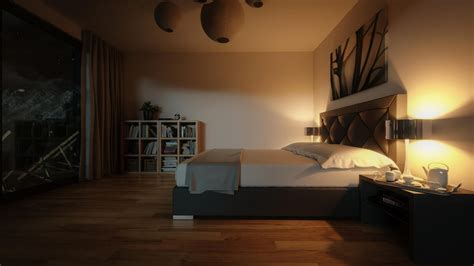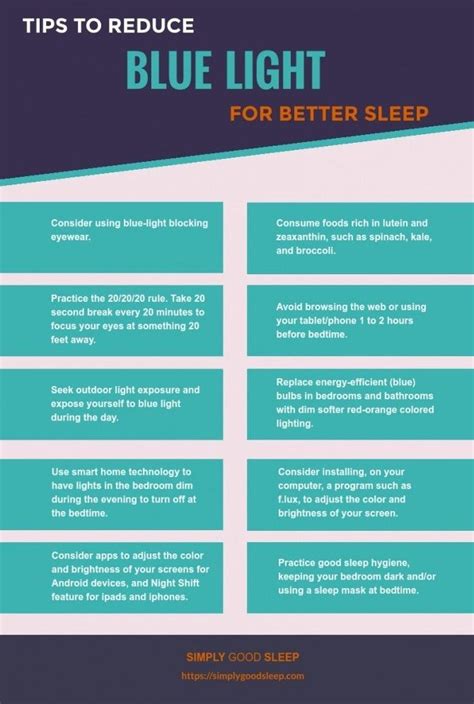Have you ever experienced those mornings when you wake up feeling completely drained, as if you haven't slept at all? We all know how frustrating it can be when a restless night's sleep affects our energy levels, productivity, and overall well-being. However, fear not, as we have compiled a list of valuable insights and clever techniques to optimize your slumber and awaken with a renewed vigor.
Restful sleep plays a pivotal role in our physical and mental health, yet many struggle to achieve it consistently. This article will delve into a variety of practical strategies that will transform your nights and have you springing out of bed with a newfound zest for life. From establishing a consistent sleep schedule to incorporating relaxation techniques into your bedtime routine, we will explore a range of methods that are bound to enhance the quality of your sleep.
In today's fast-paced world, it's crucial to prioritize self-care and ensure that our bodies and minds receive the rest they deserve. Here, we will uncover the secrets of creating an ideal sleep environment, embracing mindful practices, and making small but impactful lifestyle adjustments. By following these easy-to-implement suggestions, you will soon be bidding farewell to restless nights and embracing the gift of a refreshing morning wakeup call.
Create a Tranquil Sleep Environment

When it comes to achieving restful sleep and waking up refreshed, one essential factor is the environment in which we sleep. Surrounding ourselves with a soothing and peaceful sleep environment can greatly enhance the quality of our sleep. By creating a tranquil space, we can promote relaxation, reduce stress levels, and improve overall sleep quality.
- Keep the Bedroom Clutter-Free: A cluttered bedroom can lead to a cluttered mind. To create a calming sleep environment, it is important to keep the bedroom organized and free from unnecessary distractions. Clear away any clutter and create a serene atmosphere that promotes a sense of calm and tranquility.
- Create a Comfortable Bed: The bed is the centerpiece of the sleep environment, so it's crucial to make it as comfortable as possible. Invest in a high-quality mattress, supportive pillows, and soft, breathable bedding. By ensuring that your bed provides optimal comfort, you'll be setting the stage for a rejuvenating night's sleep.
- Control Light and Noise: Light and noise can significantly impact our ability to fall asleep and stay asleep. To create a soothing sleep environment, invest in light-blocking curtains or blinds to minimize external light sources. Consider using earplugs or a white noise machine to mask disruptive noises and promote a quiet atmosphere conducive to sleep.
- Choose Relaxing Colors: Colors have a profound effect on our mood and emotions. Opt for calming hues such as blues, greens, or soft neutrals in your bedroom decor. These colors promote feelings of serenity and relaxation, creating a visually soothing environment that can help promote better sleep.
- Set the Right Temperature: The temperature of your sleep environment can greatly impact sleep quality. Keep your bedroom at a cool and comfortable temperature for optimal sleep. Experiment with different bedding materials, such as breathable cotton or moisture-wicking fabrics, to ensure you stay cool and comfortable throughout the night.
- Introduce Aromatherapy: The power of scent can have a profound effect on our sleep. Consider using essential oils, such as lavender or chamomile, in a diffuser or as a spray in your sleep environment. These calming scents can promote relaxation and a sense of tranquility, helping you drift off into a peaceful slumber.
- Create a Technology-Free Zone: The presence of electronic devices in the bedroom can disrupt sleep patterns. To create a soothing sleep environment, designate your bedroom as a technology-free zone. Remove electronic distractions such as TVs, smartphones, and laptops, allowing your bedroom to be a sanctuary solely dedicated to rest and relaxation.
- Ensure Proper Ventilation: A stuffy or stagnant bedroom can affect sleep quality. Make sure your sleep environment is well-ventilated by opening windows or using a fan. Fresh air circulation promotes a healthier sleep atmosphere and can contribute to a more restful night's sleep.
- Consider Soft Lighting: Harsh or bright lighting can interfere with our body's natural sleep-wake cycle. Opt for soft, ambient lighting in your sleep environment. Use dimmer switches or bedside lamps with warm-toned bulbs to create a cozy and peaceful atmosphere that encourages relaxation and preparation for sleep.
- Incorporate Relaxation Techniques: Finally, incorporate relaxation techniques into your bedtime routine to further enhance your sleep environment. Practice deep breathing exercises, gentle stretching, or meditation to calm your mind and body before sleep. These techniques can help you unwind, relieve stress, and promote a deep and rejuvenating sleep.
Establish a Consistent Sleep Schedule
Regulate your daily sleep patterns to maintain a steady sleep routine that supports optimal rest and energy levels. A consistent sleep schedule promotes better sleep quality and enhances your overall well-being.
Create a Routine: Develop a daily schedule that allows for sufficient sleep and wake-up times. Establishing a regular bedtime and wake-up time trains your body to naturally fall asleep and wake up at the desired intervals.
Ensure Sufficient Rest: Dedicate enough time for sleep each night. Avoid staying up late or waking up significantly earlier on weekends, as it can disrupt your sleep schedule. Aim for a consistent amount of sleep every day to optimize your sleep quality.
Avoid Napping: Resisting daytime napping can help regulate your sleep schedule. If you feel the need to nap, limit it to a short power nap of 20-30 minutes. Avoid napping too close to your intended bedtime, as it may interfere with falling asleep or staying asleep throughout the night.
Be Mindful of Light Exposure: Exposure to natural light upon waking up in the morning helps set your internal clock and promotes a consistent sleep-wake cycle. Limit your exposure to electronic screens and bright lights in the evening, as they can disrupt your body's natural production of melatonin, a hormone that aids in sleep regulation.
Avoid Stimulants: Refrain from consuming caffeine or other stimulants close to bedtime. These substances can interfere with falling asleep and disrupt your sleep quality. Opt for herbal teas or decaffeinated beverages in the evening to promote relaxation before bed.
Establish a Wind-Down Routine: Prioritize winding down before bedtime by engaging in relaxing activities. Practice techniques such as reading a book, taking a warm bath, or practicing gentle stretching exercises to signal to your body that it is time to relax and prepare for sleep.
Keep Your Bedroom Sleep-Friendly: Create a comfortable sleep environment by ensuring your mattress and pillows provide adequate support. Keep your bedroom at a cool and quiet temperature, free from distractions such as electronic devices or excessive noise.
Consistency is Key: Stick to your established sleep schedule even on weekends or days off. Consistency in your sleep routine helps maintain a well-regulated body clock, resulting in improved sleep quality and a refreshed state upon waking up.
Track and Adjust: Monitor your sleep patterns and make adjustments as needed. Use a sleep tracking app or a journal to record your sleep duration and quality. Analyze the data and modify your sleep schedule if necessary to optimize your sleep habits for better overall well-being.
Minimize Exposure to Blue Light Before Going to Bed

Reducing your exposure to blue light in the evening can have a significant impact on the quality of your sleep and how refreshed you feel upon waking up. Blue light, which is emitted by electronic devices such as smartphones, tablets, and computers, as well as energy-efficient light bulbs, can disrupt your body's internal clock and suppress the production of melatonin, the hormone responsible for regulating sleep.
To limit your exposure to blue light before bedtime, consider implementing the following strategies:
- Dim the lights in your home or use soft, warm lighting in your bedroom to create a relaxing atmosphere.
- Avoid using electronic devices, such as smartphones and tablets, at least one hour before going to bed.
- Use blue light-blocking software or applications on your devices, which can reduce the amount of blue light emitted.
- Invest in blue light-blocking glasses, especially if you need to use electronic devices in the evening.
- Choose reading material in printed format instead of using electronic devices, as printed materials do not emit blue light.
- Consider using red or orange-tinted light bulbs in your bedroom, as these emit less blue light compared to white or blue light bulbs.
- Establish a bedtime routine that does not involve screen time, such as reading a book, taking a warm bath, or practicing relaxation techniques.
- Keep electronic devices out of your bedroom to minimize the temptation of using them before bed.
- Make your bedroom a technology-free zone by removing any electronic devices or covering them to reduce their impact.
- Replace bright alarm clocks with ones that have dim or red-tinted displays to avoid unnecessary exposure to blue light during the night.
By limiting your exposure to blue light before bed, you can optimize your sleep quality and wake up feeling more refreshed and energized.
FAQ
What are some tips to improve sleep quality?
Some tips to improve sleep quality include establishing a consistent sleep schedule, creating a bedtime routine, keeping a comfortable sleep environment, avoiding caffeine and electronic devices before bed, and engaging in relaxation techniques.
How can I establish a consistent sleep schedule?
To establish a consistent sleep schedule, it is recommended to go to bed and wake up at the same time every day, even on weekends. This helps regulate your body's internal clock and promotes better sleep quality.
What should be included in a bedtime routine to improve sleep quality?
A bedtime routine to improve sleep quality may include activities such as taking a warm bath, reading a book, practicing relaxation exercises like deep breathing or meditation, and avoiding stimulating activities or screens before bed.
Can the sleep environment affect sleep quality?
Yes, the sleep environment can greatly impact sleep quality. It is important to keep the bedroom cool, dark, and quiet. Using comfortable bedding and pillows, eliminating distractions, and reducing noise can contribute to a better night's sleep.
What are some relaxation techniques that can help improve sleep quality?
Some relaxation techniques that can help improve sleep quality include progressive muscle relaxation, guided imagery, aromatherapy, and listening to calming music or white noise. These techniques can help reduce anxiety and promote a more restful sleep.



